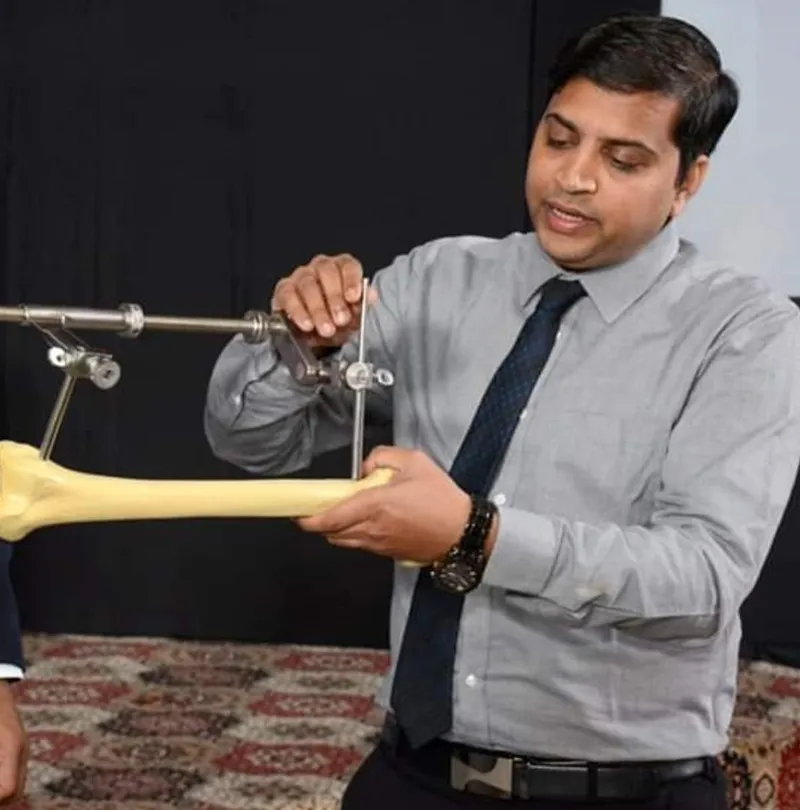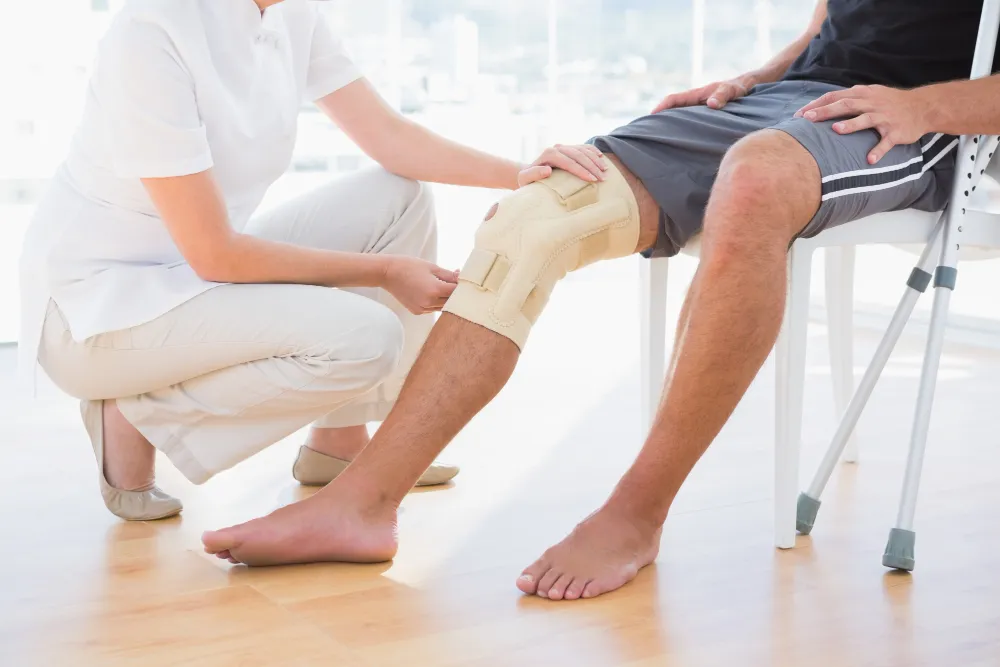Best Knee Replacement Surgeon in Nagpur
Advanced Knee Replacement Surgery for Pain Relief & Restored Mobility
Expert Care by Dr. Manoj Pahukar
Knee pain and mobility issues can significantly impact the quality of life, making simple activities like walking, climbing stairs, or even standing difficult. If you are experiencing chronic knee pain due to arthritis, injury, or degenerative conditions, knee replacement surgery might be the best solution for restoring mobility and reducing discomfort.
If you are looking for the best knee replacement surgeon in Nagpur, Dr. Manoj Pahukar is a leading expert in advanced orthopedic treatments, offering cutting-edge knee replacement surgery with high success rates and personalized patient care.


What is Knee Replacement?
Knee replacement, also known as knee arthroplasty, is a surgical procedure in which damaged parts of the knee joint are replaced with artificial implants to relieve pain and improve mobility. It is usually recommended for patients with severe arthritis, injury, or joint degeneration that makes daily activities difficult.
By restoring smooth joint movement, the procedure helps reduce pain, correct deformities, and improve overall quality of life. With modern techniques, most knee replacements last 15 – 20 years and allow patients to return to an active lifestyle.
Knee damage necessitating replacement can stem from a variety of underlying causes. Here are the primary reasons for knee damage and the rationale for opting for knee replacement.
When is Knee Replacement Necessary?
Knee replacement surgery is considered when pain, stiffness, or reduced mobility start to interfere with your daily life. It is usually recommended after conservative treatments have failed to provide relief. The goal of the surgery is to restore function, reduce discomfort & improve overall quality of life.
You may need knee replacement surgery if you experience:
- Severe Knee Pain that affects daily activities.
- Chronic Inflammation & Swelling that doesn’t subside with medications.
- Knee Deformity, such as bowing in or out of the knee.
- Limited Mobility & Stiffness that make walking or bending difficult.
- Failed Non-Surgical Treatments, including physical therapy and pain management.
Types of Knee Replacement Surgery
Knee replacement can be tailored to the specific condition of the joint, ranging from replacing a single compartment to the entire knee. The choice of procedure depends on the severity of arthritis, joint damage, and the patient’s lifestyle. Each type aims to relieve pain, restore mobility, and improve overall knee function.
Dr. Manoj Pahukar specializes in various types of knee replacement procedures based on the patient’s needs and medical condition:
Total Knee Replacement (TKR)
- Recommended for patients with severe arthritis or joint damage.
- Involves replacing both sides of the knee joint with prosthetic implants.
- Provides long-term relief and improved mobility.
Partial Knee Replacement (PKR)
- Suitable for patients with damage in only one part of the knee.
- Less invasive procedure, resulting in quicker recovery.
- Preserves more natural bone and tissue.
- Minimally Invasive Knee Replacement
- Smaller incisions leading to reduced pain and faster healing.
- Less damage to surrounding tissues and shorter hospital stay.
Revision Knee Replacement
- Performed when a previous knee replacement has failed.
- Removes the old prosthetic and replaces it with a new implant.
Why Choose Dr. Manoj Pahukar as the Best Knee Replacement Surgeon in Nagpur?
Choosing the right surgeon is crucial for a successful knee replacement. Dr. Manoj Pahukar combines extensive experience, advanced techniques, and personalized care to ensure the best outcomes for his patients. His approach focuses on safety, precision, and restoring mobility for a better quality of life.
- Highly Experienced Orthopedic Surgeon - Years of expertise in knee joint surgeries.
- Advanced Surgical Techniques - Use of minimally invasive and robotic-assisted procedures.
- Personalized Treatment Plans - Tailored solutions based on individual patient needs.
- State-of-the-Art Facilities - Modern operating theaters and rehabilitation centers.
- High Success Rate - Excellent post-surgery outcomes and patient satisfaction.
- Dedicated Post-Surgical Care - Comprehensive rehabilitation for faster recovery.
With Dr. Manoj Pahukar, you can be assured of expert care at every step. His focus is on making your recovery smooth and helping you regain an active, pain-free life.
What to Expect During Knee Replacement Surgery?
Knee replacement surgery is a carefully planned procedure designed to relieve pain and restore mobility. Understanding the process helps patients feel prepared and confident about the surgery and recovery. Below is an overview of what to expect before and during the operation.
Pre-Surgery Preparations
- Medical evaluation, imaging tests, and pre-surgical counseling.
- Lifestyle modifications and exercises to strengthen the knee before surgery.
During Surgery
- The procedure typically lasts 1-2 hours.
- Damaged cartilage and bone are replaced with prosthetic implants.
- Use of biocompatible materials for long-lasting joint function.
Post-Surgery Recovery & Rehabilitation
Recovery after knee replacement surgery is a gradual process aimed at restoring mobility, strength, and function. Proper rehabilitation and post-operative care are crucial for achieving the best long-term results and minimizing complications.
- Patients can begin light movements within 24-48 hours after surgery.
- Physical therapy is recommended for 4-6 weeks to regain mobility.
- Most patients resume normal activities within 6-12 weeks.
Causes of Knee Damage
Knee damage can occur due to different medical conditions, injuries, or degenerative changes over time. These conditions gradually affect the cartilage, bones, and overall function of the knee joint, leading to persistent pain and disability.
Osteoarthritis
- Description: A degenerative joint disease where the cartilage that cushions the ends of bones in the knee deteriorates over time.
- Impact: Leads to pain, swelling, stiffness, and decreased mobility as the bones rub against each other.
Rheumatoid Arthritis
- Description: An autoimmune disorder that causes chronic inflammation of the knee joint lining.
- Impact: Results in pain, swelling, and potential joint destruction.
Post-Traumatic Arthritis
- Description: Arthritis that develops after an injury to the knee, such as fractures, ligament injuries, or meniscal tears.
- Impact: Causes joint damage and long-term pain.
Avascular Necrosis
- Description: A condition where blood flow to a part of the bone is reduced, leading to bone death and joint damage.
- Impact: Causes severe pain and joint instability.
Congenital or Developmental Conditions
- Description: Conditions present from birth or developed during growth that affect the knee’s alignment or structure.
- Impact: Can lead to abnormal wear and tear and pain.
Infections
- Description: Severe infections in the knee joint can damage cartilage and bone.
- Impact: Causes joint destruction and severe pain.
Gout and Pseudogout
- Description: Conditions where uric acid crystals (gout) or calcium pyrophosphate crystals (pseudogout) accumulate in the knee joint.
- Impact: Causes severe pain, inflammation, and joint damage.
Reasons for Knee Replacement
Knee replacement is advised when conservative treatments like medicines, physiotherapy, or lifestyle changes fail to relieve pain and restore function. The procedure is designed to improve joint movement, correct deformities, and enhance overall quality of life.
Severe Pain
- Description: Persistent and severe pain that is not relieved by medications or other treatments.
- Impact: Pain can significantly affect daily activities and quality of life.
Loss of Function and Mobility
- Description: Difficulty performing everyday activities such as walking, climbing stairs, or getting up from a chair.
- Impact: Reduced ability to move and perform daily tasks independently.
Joint Deformity
- Description: Visible deformity of the knee joint, such as bowleg or knock-knee.
- Impact: Affects the alignment and mechanics of the knee, leading to pain and functional limitations.
Failed Conservative Treatments
- Description: Non-surgical treatments like medications, physical therapy, injections, and lifestyle changes have not provided adequate relief.
- Impact: Ongoing pain and disability despite these interventions.
Improvement in Quality of Life
- Description: The goal is to alleviate pain and restore knee function to improve the overall quality of life.
- Impact: Enables patients to return to their daily activities with reduced pain and improved mobility.
Long-Term Relief
- Description: Knee replacement offers a durable solution when other treatments fail to provide long-term relief.
- Impact: Many knee replacements can last 15 to 20 years or more, offering a significant improvement in life quality.
Knee damage resulting from conditions like osteoarthritis, rheumatoid arthritis, post-traumatic arthritis, and other diseases can lead to severe pain, reduced mobility, and decreased quality of life. When conservative treatments fail, knee replacement surgery is often necessary to relieve pain, restore function, and improve the overall quality of life for the patient.
Risks and Considerations
As with any major surgery, knee replacement carries risks such as infection, blood clots, and complications from anesthesia. However, these risks are generally low and can be managed effectively.
Overall, knee replacement surgery can be a highly effective treatment for patients with severe knee joint damage, offering significant pain relief and improved function when other treatments have not been successful.
Take the First Step Towards Pain-Free Living
Stop letting knee pain limit your mobility and independence. With advanced knee replacement surgery in Nagpur, you can restore movement, reduce pain, and get back to the activities you love.
Frequently Asked Questions
How long does it take to recover after knee replacement surgery?
Most patients can resume daily activities within 6-8 weeks. Full recovery, including strength and flexibility, may take 3-6 months with proper rehabilitation and physiotherapy.
How long does a knee replacement last?
Modern knee implants usually last 15-20 years or longer, depending on activity level, weight, and overall health. Regular check-ups ensure long-term performance.
Will I regain full movement in my knee after surgery?
Most patients regain significant mobility and pain relief, though some may experience minor limitations compared to a natural knee. Physiotherapy is key to improving the range of motion.
Can both knees be replaced at the same time?
In certain cases, both knees can be replaced simultaneously. Your overall health, age, and surgeon evaluation determine whether a simultaneous or staged approach is safer.
What is the difference between total and partial knee replacement?
A total knee replacement replaces the entire joint surface, while a partial replacement only replaces the damaged portion. The choice depends on the extent of joint damage and surgeon assessment.
How soon can I start walking after knee replacement surgery?
Most patients begin walking with support, like a walker or crutches, within 24-48 hours after surgery. Early movement helps prevent stiffness and accelerates recovery.
